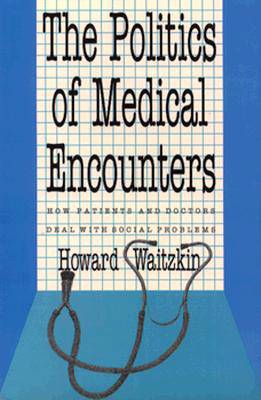
- Afhalen na 1 uur in een winkel met voorraad
- Gratis thuislevering in België
- Ruim aanbod met 7 miljoen producten
- Afhalen na 1 uur in een winkel met voorraad
- Gratis thuislevering in België
- Ruim aanbod met 7 miljoen producten
The Politics of Medical Encounters
How Patients and Doctors Deal with Social Problems
Howard WaitzkinOmschrijving
The complaints that patients bring to their doctors often have roots in social issues that involve work, family life, gender roles and sexuality, aging, substance use; or other problems of nonmedical origin. In this book, physician/sociologist Howard Waitzkin examines interactions between patients and doctors to show how physicians' focus on physical complaints often fails to address patients' underlying concerns and also reinforces the societal problems that cause or aggravate these maladies. A progressive doctor-patient relationship, Waitzkin argues, fosters social change.
Waitzkin provides a pathbreaking analysis of medical encounters, applying perspectives from structuralism, post-structuralism, and critical literary theory to transcripts of recorded conversations between doctors and patients. He demonstrates how doctors unintentionally maintain dominance in their dealings with patients, encourage conforming social behavior and attitudes, and marginalize patients' concerns with social problems. Waitzkin urges physicians to attend to the social as well as the medical problems that emerge from patients' narratives and suggests ways to restructure the manner in which patients and doctors communicate with each other. Physicians and patients, for example, should work together to demystify medical discourse, should refrain from medicalizing social problems through medications or reassurances that dull socially caused pain, and should be prepared to call on advocacy organizations seeking to change the social conditions that create personal distress.
This book will influence and challenge physicians scholars, and students in the social sciences and humanities, as well as anyone concerned about the present problems and future direction of medicine.
Specificaties
Betrokkenen
- Auteur(s):
- Uitgeverij:
Inhoud
- Aantal bladzijden:
- 327
- Taal:
- Engels
Eigenschappen
- Productcode (EAN):
- 9780300055115
- Verschijningsdatum:
- 27/01/1993
- Uitvoering:
- Paperback
- Formaat:
- Trade paperback (VS)
- Afmetingen:
- 155 mm x 234 mm
- Gewicht:
- 498 g

Alleen bij Standaard Boekhandel
Beoordelingen
We publiceren alleen reviews die voldoen aan de voorwaarden voor reviews. Bekijk onze voorwaarden voor reviews.












